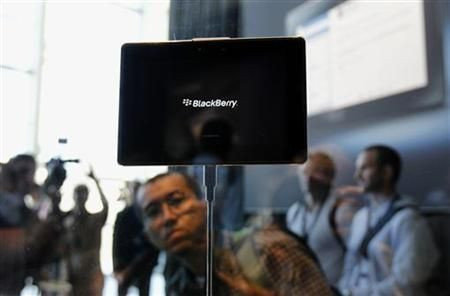Blackberry Playbook Not Abandoned ... Yet

Research in Motion on Thursday rebuffed speculation that it was following HP's footsteps in abandoning its poorly performing Playbook tablet, but the move highlights its difficulties penetrating Apple's dominant market position.
The company said assertions that the Touchpad was done were false, after industry checks suggested the manufacturer for the device had laid off dozens of staff.
Rumors suggesting that the BlackBerry PlayBook is being discontinued are pure fiction, RIM said in an e-mailed statement. RIM remains highly committed to the tablet market and the future of QNX in its platform.
While the Playbook may have dodged the bullet for now, the incident brings to fore its challenges gaining meaningful ground in the tablet space.
RIM, known for its Blackberry smartphones, entered the burgeoning tablet market in April this year, but has admittedly failed to make a major impact.
Earlier this month the company said shipments of its supposed iPad-killer tablet totaled 200,000 units last quarter, less than half of analysts' expectations, and even missed the company's own projections.
In comparison, Apple sold 9.25 million iPads last quarter.
Earlier Thursday, Collins Stewart's chip analyst John Vinh kicked off speculation, telling clients that RIM may have halted its production and cancelled future tablets.
Vihn told clients Thursday that RIM has stopped production of its PlayBook and is actively considering exiting the tablet market, citing original design maker Quanta having ceased to make the device.
While Quanta last week acknowledged that it had laid off a significant number of production workers from a factory focused on producing the PlayBook, our research indicates that the ODM has essentially halted production of the tablet, Vinh added.
A number of retailers selling the PlayBook have cut prices recently in what analysts see as a bid to push out rising inventory.
The poor showing underscores the lack of careful planning and execution that has unfortunately become a hallmark of its recent efforts. The device, much like its once-hyped Storm smartphone, was pushed out in haste, lacking refinement and consumer understanding -- and like the Storm, flopped.
Co-CEO Mike Lazaridis conceded during its Q3 earnings call that the PlayBook had been thwarted by a lack of apps and content, but pinned hopes its new service ecosystem, built around its forthcoming QNX platform, will give it the boost it needs.
Like Apple with its iOS, and Microsoft with Windows, creating a successful platform will be dependent on software and services that third-part developers created around it.
Time will tell if the bet pays off, but the company already is showing strains of executing the strategy. Because of the delays in QNX, RIM was forced to roll out a Blackberry 7 OS as an intermediate step, but that is fracturing its already small developer community.
© Copyright IBTimes 2025. All rights reserved.





















